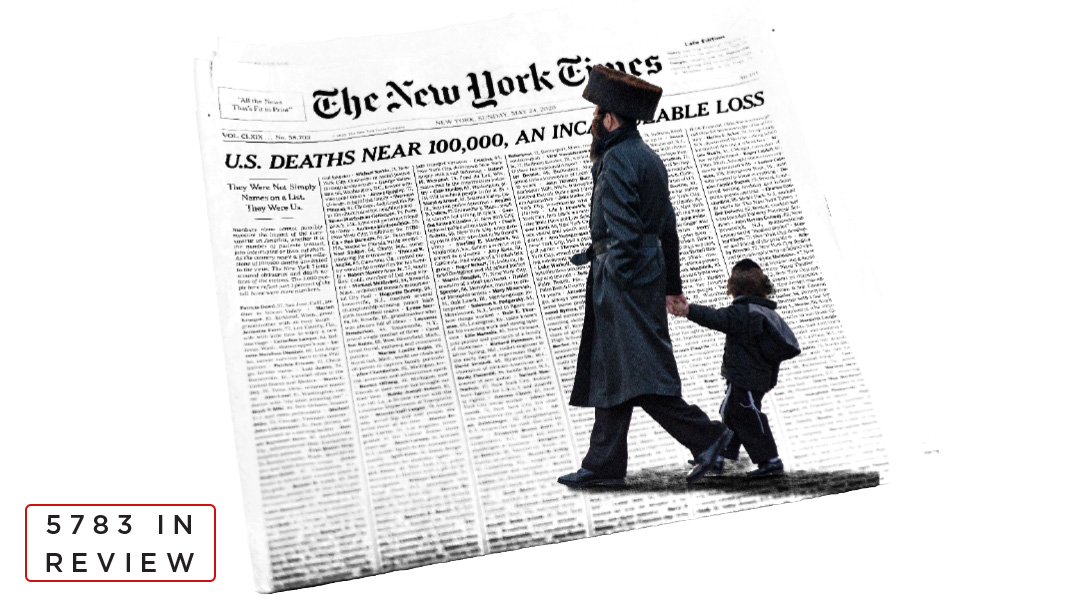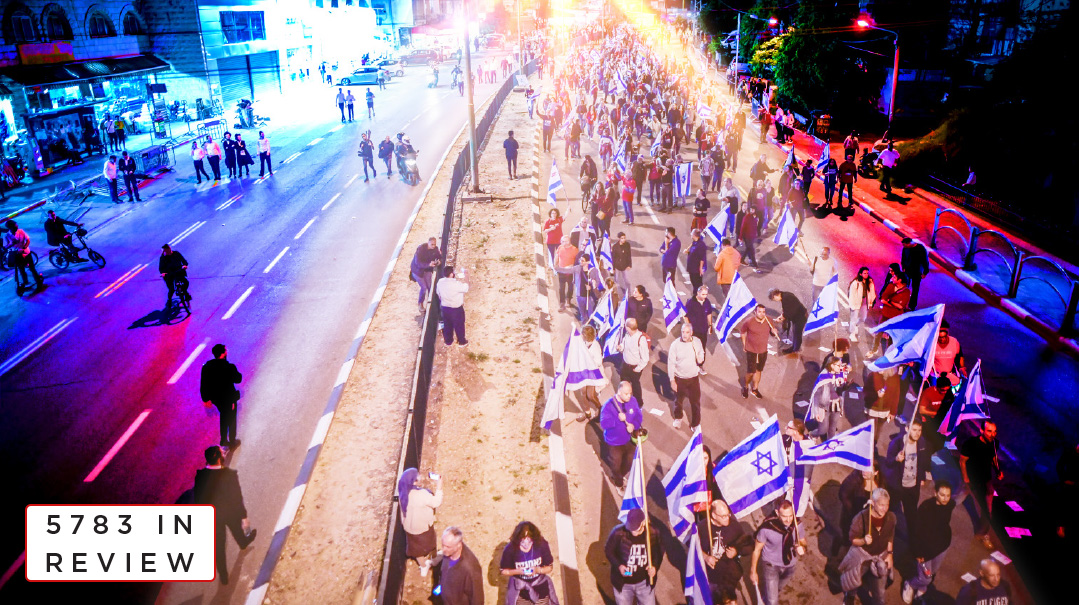Knesset Channel: 5783

In a by-now familiar cycle, the more powerful the chareidim are in a given Netanyahu government, the harder they fall in the next election

Learning the Hard Way
“WE
refused to accept the limitations of power, so we learned it the hard way,” says United Torah Judaism MK Meir Porush, minister of heritage and Jerusalem affairs, summing up 5783.
As the scion of a long line of Yerushalmi askanim, Porush understands the distinct characteristic that has enabled the chareidi community to survive as an insular and autonomous society through the Ottoman Empire, the British Mandate, and the State of Israel.
Chareidi Jewry in modern Eretz Yisrael has always known how to hold its ground. It operates from the position of a disadvantaged minority, seeking only to live by its own laws and customs, without striving to impose those values on the broader public.
But from election to election, as the chareidi parties’ political importance has grown, those basic principles have gradually eroded.
One chareidi leader who warned against the dangers of power was Rav Aharon Yehuda Leib Steinman, back during Netanyahu’s second term as prime minister from 2009 to 2013.
Then as now, the chareidim had just returned to the government from the opposition wilderness and seized control over as many positions of influence as possible. Rav Steinman warned against exhibiting an overbearing attitude, which would lead to a backlash from the secular street. Sure enough, at the very next elections, in 2013, the chareidim were kicked out the door.
Looking back, we can see that this pendulum has been swinging back and forth ever since Netanyahu was elected to his first term in 1996. He’s never had allies more loyal than the chareidim, and Bibi, for his part, has always rewarded them generously, despite his reputation for breaking agreements.
In a by-now familiar cycle, the more powerful the chareidim are in a given Netanyahu government, the harder they fall in the next election. After Netanyahu’s first term from 1996 to 1999 came the fleeting Ehud Barak premiership, in which the chareidim served as a fifth wheel before being discarded altogether.
When the late Arik Sharon put an end to Barak’s brief and dangerous term with chareidi help in 2001, the chareidim returned to the top of the wheel, only to be thrown off it yet again — by Sharon himself — in 2003.
When Netanyahu returned to power in 2009 — after three years of the Olmert government, in which UTJ sat in the opposition — the chareidim returned to power in the government, only to be thrown back to the opposition in 2013. In 2015 they got back into the game, big time, only to be booted out again in 2021 by the Bennett-Lapid government.
Anyone who expected chareidi representatives to finally learn from their mistakes has been bitterly disappointed over the past year. In the same cycle of hubris, the chareidim found themselves being drawn into a head-on confrontation with the liberal public — over the judicial reform, something that doesn’t directly concern the average chareidi.
When it comes to the chareidi community’s most existential need — preserving the right of Torah learners to learn — chareidi politicians have made no progress, and it seems highly unlikely that they will in the winter of 5784, given the protests in the streets and the fact that prominent Likud MKs are distancing themselves from the agreements reached during the coalition negotiations.
They say that wisdom is the ability to learn from others’ mistakes, but what can one say of someone who can’t learn from their own mistakes? Too late, the chareidim remembered Rav Steinman’s admonition, and began trying to distance themselves from the judicial reform. But for the secular public, this might be a case of too little, too late.
On paper, the government still has three more years, but the Israeli right’s dramatic collapse in the polls in recent months is ominous.
It seems that this time, no political sleight of hand will save the chareidim from the fate that awaits them after the next elections.
61: Number of the Year
The magic number of Israeli politics has become 61. For four consecutive elections, starting in 2019, neither political bloc was able to hit the magic number and clinch an absolute majority in the Knesset.
Even when Bennett teamed up with the left, and it briefly seemed that a governing majority had finally emerged, it was clear that the unconventional marriage was doomed from the start.
In 5783, the Israeli right shattered expectations by netting a clear majority of 64 seats, three more than necessary. But eight months into the government, we’ve learned that there’s such a thing as winning by too much. The right’s lopsided victory led directly to the hubris that has brought the country to the brink.
Who’s Up/Who’s Down
Some years, who’s up and who’s down is one and the same person. Binyamin Netanyahu is without doubt the big winner of the year after his improbable return to power with a decisive majority of 64 seats.
I was in the room before the elections as he forged a series of electoral pacts between his right-wing allies, a brilliant maneuver that maximized votes and led to a big win by the right-wing bloc.
But ever since he’s returned to power, he seems determined to squander the achievement with his own two hands. The coalition agreements were nothing short of a fiasco, entrusting key positions to unreliable allies, including Yariv Levin — who embarked recklessly on the judicial reform without laying the groundwork, politically or PR-wise.
With terrorists in the streets and rampant crime in the Arab sector, Bibi can look in the mirror for both the big winner and the big loser of 5783.
Ray of Light: Shalom Aleichem
One image from the past year has been permanently etched into our collective memory. It happened during the protest movement’s recent march through Bnei Brak on a Thursday night, when the city comes to life ahead of Shabbos.
In a display of restraint, Bnei Brak residents greeted the protesters with challah and cholent, playing Shabbos songs in the background.
And then, in a stirring moment, one of the protesters removed his motorcycle helmet, raised his hands to the sky and with tears in his eyes began singing Shalom Aleichem.
“I remembered the home of my father z”l, who always looked for common ground,” the protester said later.
This image will be remembered as a ray of light — the pintele Yid shining through the disguise.
(Originally featured in Mishpacha, Issue 978)
Oops! We could not locate your form.







